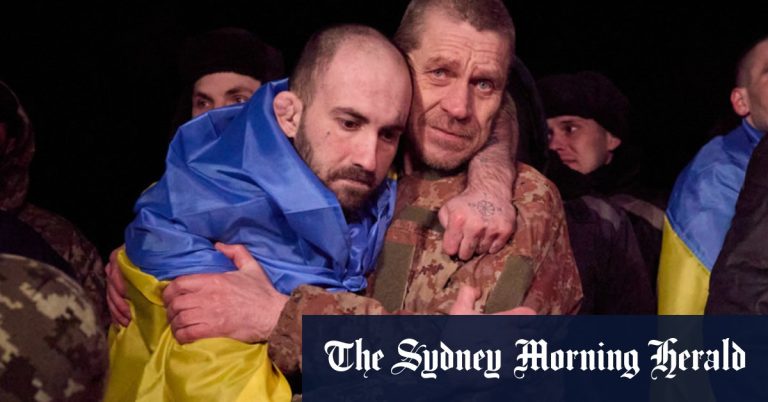Also Wednesday, Russia said it shot down 12 missiles fired at one of its southern regions bordering Ukraine, as Kiev's forces seek to embarrass the Kremlin and refute President Vladimir Putin's argument that life is going on normally despite the fighting.
Regional Governor Vyacheslav Gladkov said in a tweet on Telegram that the situation in the border city of Belgorod, which was subjected to two rounds of bombing on Wednesday morning, “remains tense.”
“The air defense systems worked,” he added, promising more details about possible damage after inspecting the area later in the day, as part of the New Year holiday in Russia.

Ukrainian soldiers celebrate their freedom after a prisoner exchange with Russia – the largest since the start of the war.credit: @ZelenskyyUa
The Russian Defense Ministry said that Ukraine fired two Tochka-U missiles and seven missiles into the region earlier, followed by six Tochka-U missiles and six Failka missiles.
The Soviet-made Tochka-U missile system has a range of 120 kilometers and a warhead that can carry cluster munitions. Ukraine has received some cluster munitions from the United States, but the Tochka-U and Velkha aircraft can use their own cluster munitions.
The Russian side of the border has come under increasingly frequent attacks in recent days. Throughout the war, border villages have been intermittently targeted by Ukrainian artillery, rockets, mortar fire and drones launched from dense forests where they are difficult to detect.
Recently, as Russia fired missiles and drones at Ukrainian cities, Kiev forces targeted the regional capital of Belgorod, located about 100 kilometers north of Kharkiv, Ukraine's second-largest city.
Belgorod, with a population of about 340,000 people, is the largest Russian city near the border. It can be accessed with relatively simple and portable weapons such as multiple rocket launchers.
The bombing of the city of Belgorod on Saturday killed 25 people, including five children, in one of the bloodiest attacks on Russian territory since the large-scale invasion of Moscow. Another civilian was killed on Tuesday in new bombing.
Striking Belgorod and disrupting life in the city is an exciting way for Ukraine to demonstrate its ability to respond to Russia, whose army is outnumbered and superior to Kiev's forces.
This tactic appears to have had some success, with signs that the attacks are alarming the public, political leaders and military observers.
download
On Monday, Putin criticized the Belgorod attacks launched by Ukraine. He added: “They want to intimidate us and create a state of uncertainty within our country,” and promised to intensify retaliation operations.
In response to a question from a soldier who asked him about civilian casualties in Belgorod, Putin said: “I also feel very angry.”
Many Russian military bloggers lamented Moscow's withdrawal from the border region in September 2022 amid a rapid counteroffensive by Kiev, and argued that more territory should be captured to secure Belgorod and other border regions.
download
Russia describes the Ukrainians as “terrorists” who indiscriminately target residential areas while insisting that Moscow is only targeting warehouses, weapons factories and other military facilities – despite sufficient evidence that Russia is striking Ukrainian civilian targets.
Ukrainian officials rarely acknowledge responsibility for attacks on Russian territory.
In another Russian border region, local officials said that the city of Zeleznogorsk was briefly cut off from the electricity grid after the Ukrainian bombing.
Kursk Governor, Roman Starovoit, said on the Telegram application that the authorities were forced to temporarily close a power substation in the city of 100,000 people in the Kursk region to repair the damage caused by an air attack.
download
He added that residents were cut off from electricity or heating, although electricity was restored to most parts of the city after about two hours.
Russia has recently intensified its long-range attacks on Ukrainian cities, including the use of Kinzhal missiles that can fly at 10 times the speed of sound. The British Ministry of Defense said that Kremlin forces appear to be targeting the Ukrainian defense industry.
The attack prompted officials in Kiev to call on their Western allies to provide more air defense support.
NATO announced on Wednesday that it will help member states buy up to 1,000 guided Patriot surface-to-air missiles in a deal that could cost about US$5.5 billion ($8.1 billion). This could allow coalition members to send more of their defense systems to Ukraine.
AP

